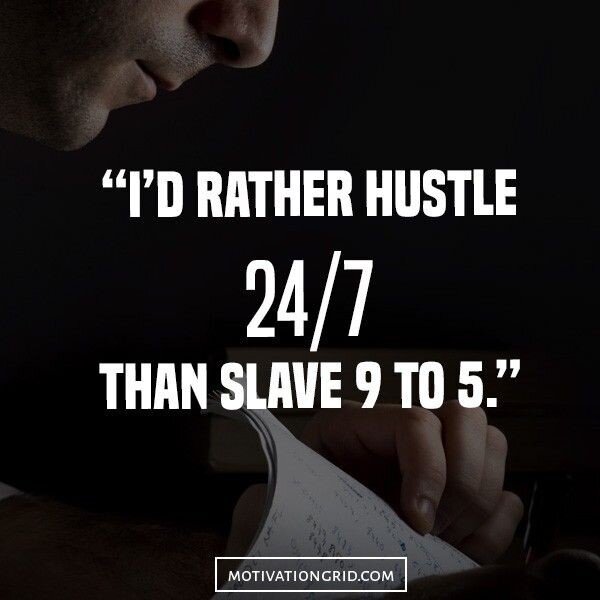HUSTLE CULTURE: PERFORMATIVE WORKAHOLISM AND AN INFATUATION WITH ‘THE GRIND’
By Reva Croft
Felt like lockdown ruined your workflow? Think the I-need-more-hours-in-the-day existence was better than this there-are-too-many-hours-in-the-day liminal state? This might be because, until the COVID-19 pandemic, hustle culture was riding the trend of, “Gobble, Gulp and Go,” pushing yourself for all 86,400 seconds of the day.
The toxicity of hustle culture is evident if you look at who, where and how it is perpetrated. At WeWork, an office sharing space, the message, “DON’T STOP WHEN YOU’RE TIRED STOP WHEN YOU ARE DONE” is engraved onto cucumber in a water dispenser. Sure, a little motivation from a cucumber for those in the monotony of the 9 to 5, what’s the big deal? Take a look at the veg-inscribed mantra again. It implies that the 9 to 5 isn’t enough, that workers should sacrifice their health for the sake of the task at hand. But, increased worker productivity benefits someone, and it’s not the ones putting the hours in. Encouraging and idolising the work of high-energy, action-focussed go-getters will inevitably benefit those who already profited the most from the workforce: the fat cats at the top.
But to what end? Maybe the motivation of a thriving and fulfilling career, a flat in a prime area of the city, and money to spare for those all-important “after-work drinks” is no longer enough for the yuppies of today. After all, what’s the point of living in gentrification-central if you have no time to visit that ridiculous hipster, toothbrush themed bar you walk past on your 5-minute commute every day? Maybe we’ve lost our purpose – it’s not to reproduce (no kids = more time to work = more money), ascribed religion is falling (I could be working on my LinkedIn profile on Sunday mornings) and it’s definitely not ‘experiencing the world’ (I don’t care if it’s one of the 7 wonders of the world or a 2000-year old tradition, if there’s no Wi-Fi I’m not going). Quarter-life crises are commonplace, with young people latching onto sudden obsessions – social justice, sustainable development, animal rights, flat earth-ism – in an attempt to define who they are and what their purpose is. So maybe productivity has filled the space that children, religion, discovery, all inter-personal experiences, once held in the human psyche. It would fit.
Hustle culture has instilled in workers that our value as humans is based on our productivity on a relative scale, rather than an absolute scale. The scale here is important. This is a generation whose skulls have ‘good grades + extracurricular overachievement = future rewards’ imprinted on the inside like it’s the quadratic formula. (That’s there too. In smaller font.) And this mentality continues beyond school and university life, and into the workspace. The idea that you have to do everything you can to beat the competition on paper translates to ’hustle until you no longer have to introduce yourself’. Don’t get me wrong, competition is good, but shouldn’t that competitive streak be channelled into creative and outside-the-box thinking to outsmart a market competitor, the opposition in a legal battle, hell, the coronavirus, rather than your co-workers in an administrative efficiency battle? How much of the ‘work’ done is productive, and how much is just our infatuation with being busy?
In some way, the tech mantras that ‘the internet can change the world’ have infiltrated non-tech corporations and have let this generation down. We are collectively working harder, stronger, faster under the pretence of accomplishing our hopes and dreams at the same speed it takes a successful Silicon Valley start-up to disrupt normality out of nowhere. Think Amazon, Uber, Airbnb. Despite the stereotypes that surround millennials, their work obsession seems to be driven as much by themselves as by the corporate structure. Social media has played a huge role in introducing performative workaholism as a road to success in entrepreneurialism. Elon Musk, business magnate and overall icon to young people tweeted that “Nobody ever changed the world on 40 hours a week,” adding that the correct number of hours a week to change the world, “Varies per person, but about 80 sustained, peaking above 100 at times. Pain level increases exponentially above 80.” The last sentence seems a throwaway comment, but actively glorifies the exhaustion of a worker and justifying burnout, the real cost of hustling hard. The appeal of social media is its culturally perfect appearance; there is no mention of the failed start-ups, the job rejections, and the days when you don’t get out of bed. And so, we are made to think that humblebrags of 17-hour #hustlelife workdays should be praised, 3am #entrepreneur updates are to be encouraged, and the 6am #soblessed rooftop yoga session is essential. It’s a grim and exploitative picture: change will be slow unless huge cultural change is implemented, and with the generation in question notoriously trying to live up to unrealistic and unsustainable Instagram realities, corporations may be the starting point.
After all, we never would have thought #thankgoditsmonday, #sleepisforlosers, and, perhaps most of all, #riseandgrind, were venerating work.


